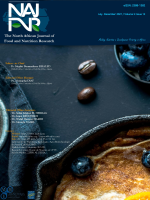Main Article Content
Effect of traditional processing methods on protein digestibility and chemical constituents in seeds of Bauhinia petersiana
Abstract
Background: Antinutritional factors present in food may reduce the bioavailability of nutrients and cause harmful effects to human health.
Aims: The aim of this study was to determine the effect of traditional processing methods on protein digestibility, nutrient and antinutrient constituents of seeds of Bauhinia petersiana.
Subjects and Methods: The seeds were processed by soaking in water, boiling or roasting before analyzing protein digestibility, nutrient and antinutrient compositions.
Results: Soaking resulted in no significant changes in the content of moisture, protein, fiber, phytates and trypsin inhibitor activity and significant reductions in fat, ash and tannins. Roasting resulted in no significant change in the content of moisture, ash, protein, and fiber and significant reductions in fat, phytates and trypsin inhibitor activity. Boiling resulted in a significant increase in the content of both protein and fiber and reduction in fat, ash, tannins, phytates and trypsin inhibitor activity. Mineral content of zinc, magnesium and calcium was not changed by soaking, roasting or boiling of the seeds. The calculated phytate: zinc molar ratios for both the raw and processed seeds were greater than 10, the limit for optimal absorption of zinc in the small intestine whereas phytate: iron molar ratios were less than 14, the limit for optimum absorption of iron in the intestines. In vitro digestibility of proteins in the seeds was increased when the seeds were soaked, roasted or boiled.
Conclusions: Boiling the seeds of B. petersiana before consumption would effectively remove undesirable antinutrients while maintaining the nutrient content of the seeds and improving digestibility of proteins.






